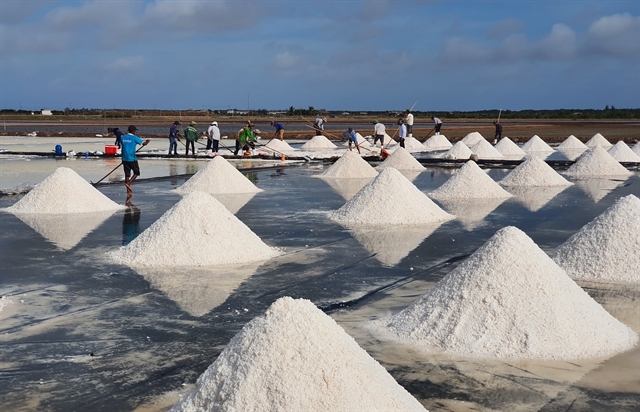
BẠC LIÊU — The Cửu Long (Mekong) Delta province of Bạc Liêu is taking measures to improve the quality and value of salt production to improve farmers’ incomes.
The delta’s largest salt producing province aims to have 1,350ha of land devoted to producing high-quality salt by 2025 following an investment of nearly VNĐ140 billion (US$6.1 million).
It will develop infrastructure for and mechanise some stages of salt production.
It will reorganise production, develop linkages producers and consumers and diverse products.
It will also develop brands, geographical indications and origin traceability and promote its salt – related products.
It is soliciting investment in the production of high-value salts used in healthcare and industry.
Lưu Hoàng Ly, director of the province Department of Agriculture and Rural Development, said these measures would enable the province’s salt production to develop and ensure salt farmers remain keen.
In the 2020 – 21 season the province produced 50,000 tonnes on more than 1,500ha of land, using modern methods like using plastic sheets to cover the field beds to produce cleaner salt on 100ha.
The production is done mostly in Đông Hải District, which accounted for 1,300ha, and Hoà Bình District and Bạc Liêu City.
Nguyễn Hoàng Quốc, chairman of the Huy Điền Co-operative in Đông Hải, said not many farmers can afford to use plastic sheets to produce cleaner salt.
It costs VNĐ140 – 150 million ($6,100 – 6,500) per 1,000sq.m, he said.
The province produces various kinds of salt – related products for both the domestic and export markets.
The Bạc Liêu Salt Joint Stock Company, for instance, produces refined, clean grain, dried clean grain, iodised refined, red chilli, chilli shrimp, and pepper salts.
It sells them to supermarkets in the country and exports them to the US, Japan, South Korea, and other markets at the rate of around 100 tonnes a month.
Its refined salts have been recognised as four-star OCOP products under the country’s one commune – one product programme.
The province has a big advantage in salt production in terms of soil and climatic conditions, and its products are popular among consumers around the country for their high quality.
But producers often face a situation of getting low selling prices when they have a bumper harvest as they lack guaranteed outlets and mostly depend on traders.
The production season normally begins in December together with the dry season.
The province’s salt production has been recognised as a national intangible cultural heritage by the Ministry of Culture, Sports and Tourism in 2020.
The province aims next to develop salt fields into tourism destinations. — VnExpress News
- Reduce Hair Loss with PURA D’OR Gold Label Shampoo
- Castor Oil Has Made a “Huge” Difference With Hair and Brow Growth
- Excessive hair loss in men: Signs of illness that cannot be subjective
- Dịch Vụ SEO Website ở Los Angeles, CA: đưa trang web doanh nghiệp bạn lên top Google
- Nails Salon Sierra Madre
 VnExpress News The News Gateway of Vietnam
VnExpress News The News Gateway of Vietnam





